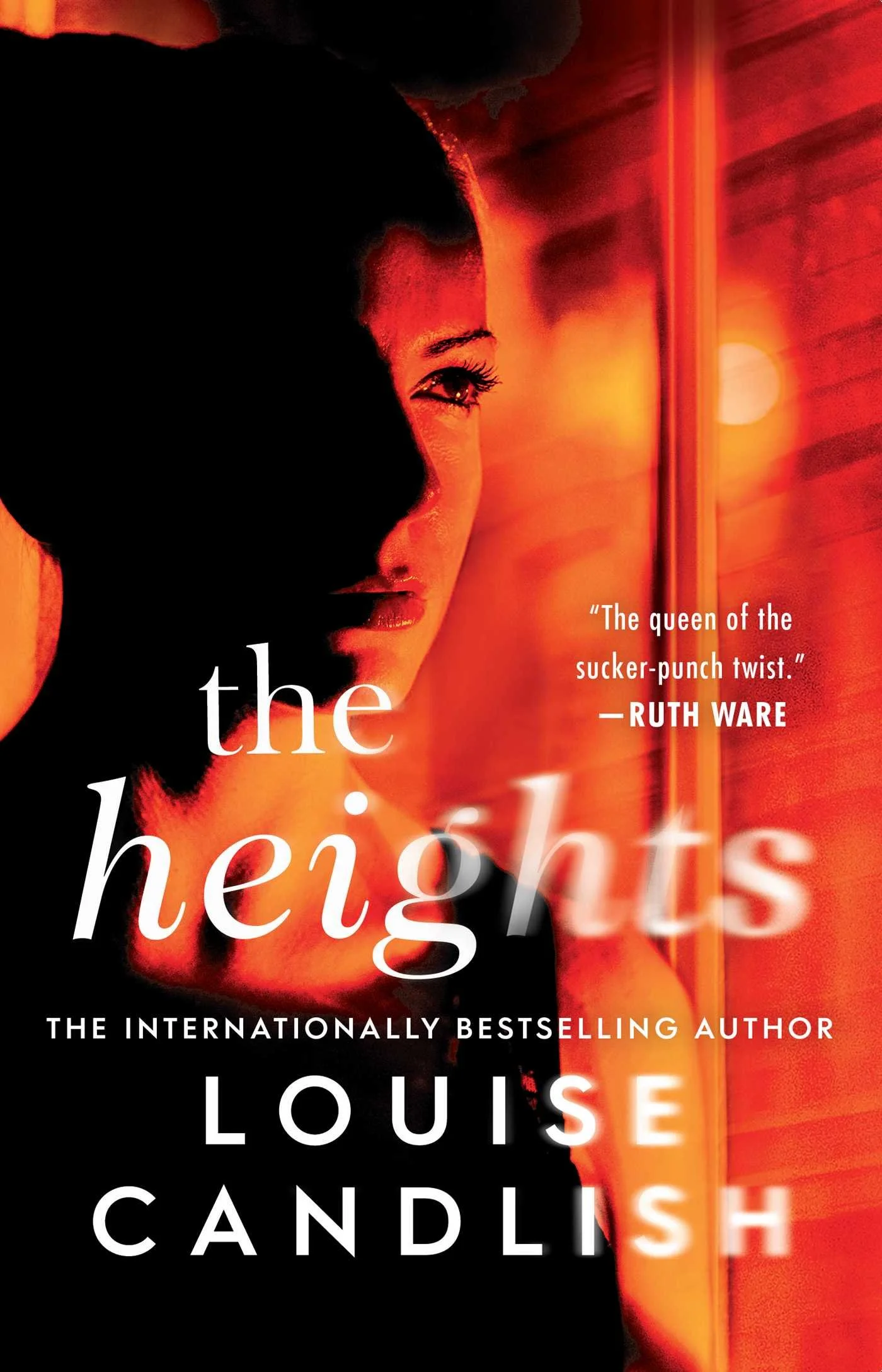Preview of The Heights
Preview of The Heights by Louise Candlish
ONE
Kieran Watts has been dead for over two years when I see him standing on the roof of a building in Shad Thames.
It is October 2019, a Monday that should be unremarkable.
For those who don’t know the area, Shad Thames is a historic parcel of riverside London just southeast of Tower Bridge. Think step-back-in-time wharves with winches and walkways and cobbled alleys running red with the blood of bygone crimes (okay, that’s in poor taste. I apologize).
For those who don’t know the man, Kieran Watts is the monster who destroyed my life. Whose actions will torment my soul until my dying day, and perhaps even beyond—I wouldn’t put it past him. He is the reason I am writing this, the reason I am here. As I once said to my daughter, Freya, not missing the look of revulsion on her face: I will never forgive him.
I mean it. Never.
So, I’m in Shad Thames for work. It’s been raining overnight and the riverside palette is all soot and stone, rust veining the dark-painted ironwork. My new client is called Selena. She’s in her early thirties, white British mixed with something chic and southern European. She works in finance, which explains her acquisition of a fifth-floor flat in Jacob’s Wharf, one of the east-facing warehouse conversions overlooking St Saviour’s Dock. Though beautiful, the apartments have inconveniently small windows, calling for lighting expertise beyond what your average sparky will dispense, and I’ve been brought in by the architect commissioned by Selena to do her refurb. This first meeting is for me to get a sense of her lifestyle and personal aesthetic. Naturally, she wants it both ways—the candlelit romanticism of smugglers conspiring in shadowy corners and the radiant, flattering light beloved of the millennial narcissist (her words, not mine).
But you don’t need to hear about that. Rest assured I’ll light her beautifully. What’s important here is what happens after the consultation.
We are sitting at her breakfast bar by the window, with cups of espresso and shortbread cookies she claims to have baked in the microwave, when she says, “You wouldn’t need your trickery up there, would you?” And she gestures to the building directly opposite.
It’s a slender modern structure slotted between two warehouses, its top protruding like an elongated head on broad shoulders. Each floor has a large lozenge-shaped window overlooking the water, with a second full-height one to the right running up the building in a reflective stripe. Though all its units must get their share of natural light, the top flat has what looks like an atrium or skylight behind a roof terrace that spans the full width of the building.
“There must be a great view of Tower Bridge from that terrace.” I bite into a cookie and sugar grains melt on my tongue. “It’s an unusual building, isn’t it?”
“Went up in the early nineties, apparently,” Selena says. “I don’t know how they got permission to build so high.”
“Oh, it was the Wild West back then. Some of us remember it firsthand.” I raise my eyebrows at her and she does the same back. I smile.
Seek out people who improve your mood, Ellen, a counselor once advised, but it was too soon then. I understand better now.
“It’s the tallest building in Shad Thames, I think,” she says. “And
he’s the king of the castle, look.”
Craning to glimpse the man who has come out onto the terrace and stands at the clear glass balustrade, I find that my first thought, as it always is when I witness someone poised inches from a sheer drop like that, is, He’s going to throw himself off. He’s going to lean forward, look down, and hear the call of the void, exactly as I would. Then he’ll jump.
I say as much to Selena and she exclaims in horror. “But why would he want to jump?”
“Not him, me. If I were standing where he is. Don’t worry, it’s nothing to do with feeling suicidal. It’s a condition. They call it high place phenomenon.”
“What, it’s like vertigo?”
“That’s more a sensation of spinning—like in the movie. This is a kind of irrational impulse. But not everyone has it.” I gesture to our man on the roof terrace, as still and poised as an elite diver about to go for gold. “He obviously doesn’t.”
“Well, it wouldn’t be the best place to live if he did,” Selena says, with a smirk, as he turns and walks the length of his terrace to its river-facing corner.
That’s when it happens. The impossible. The grotesque. There’s a self-consciousness to the way this man lifts his chin, an exaggerated bounce to his step, that I recognize. That makes me put my hand to my mouth to muffle a gasp, my heart punching a savage rhythm in my chest.
It’s him.
The desire to flee collides with a compulsion to keep my eyes fixed on him, to learn all that I can in the time available. Absorb the clues. The distance between us is too great for me to be able to make out his features, though I can see his hair has been bleached, and he’s a good twenty pounds lighter than I remember from when I last saw him, almost two and a half years ago.
No, it can’t be him. If there’s any link at all, this must be a relative of his. He said he had no family back then, but that doesn’t mean none existed. This could be a cousin or a half sibling, someone he never even met.
He stretches his arms to the sides and raises them above his head, bringing his palms together in some sort of meditative pose. He was never so composed in the past—even in court, he fidgeted constantly. I feel bile slide through my throat and up into my mouth.
“You okay?” Selena asks, a stitch of concern between her brows. “Is it the vertigo thing? Let me close the window . . .”
I swallow, drop my hand from my face. “No, no, I’m fine. Do you . . . do you know that guy?”
“Not to speak to. I’ve seen him, though, in that café on Mill Street. He always buys the biggest bucket of coffee. Wait, maybe we did speak once, I don’t remember. Why?”
“He reminds me of someone.” It’s a struggle to control my facial muscles and I feel myself grimace. “Someone I didn’t think was . . . in London.”
Selena moves to the window for a better look, obscuring my own view. “He looks pretty young, doesn’t he? Must be a banker. No, something in tech—a banker wouldn’t still be at home at ten in the morning. Or maybe he’s a rich overseas student, there are so many of them around here. Russians, mainly.”
I silently burn for her to get out of the way, but by the time she does, he’s disappeared. “Where did he go?” I ask, foolishly.
“Back inside. Don’t worry, he didn’t jump. If he did, would he land in the water? These walkways are pretty narrow.”
As she leans steeply out of the window to remind herself of the dimensions of her own building’s waterfront, I suppress a shudder and get to my feet.
“Time for me to get going.”
She walks me out and I step into the lift gratefully, like someone being airlifted from a war zone. Only now, alone in that mirrored box, do I allow myself to receive at full voltage my anguish at the memory of a boy called Kieran Watts and the power he had over my son, Lucas. The sheer predictability of Lucas’s response to his God-given cool.
Of course, by this stage in the game—middle age—we know cool is just another way of saying restless, reckless.
Careless.
The lift gives a queasy little lurch before coming to a stop. The doors part and I step out. The lobby looks the same as it did when I arrived, but the floor feels like sand moving beneath my feet and I press a hand to the exposed brick wall to steady myself.
It can’t be Kieran Watts, I tell myself. And if anyone can be sure of that it is me.
Because I’m the one who killed him.
Preview of The Heights by Louise Candlish





